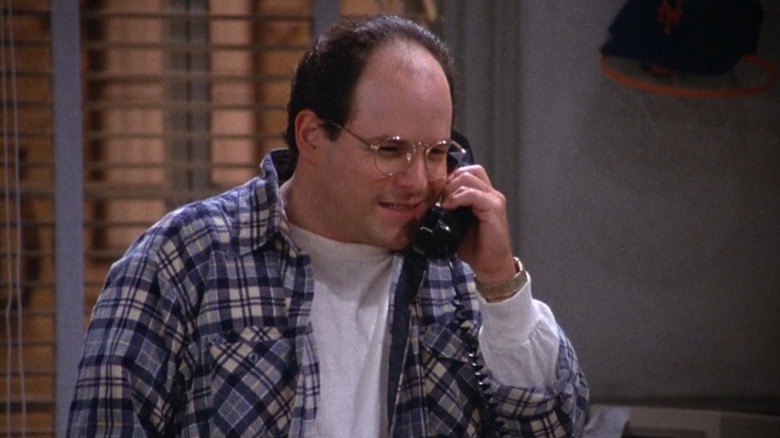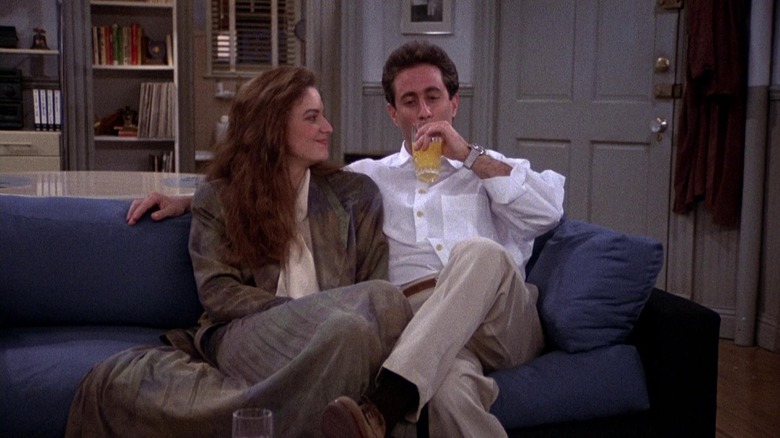Larry David's Past Relationships Saved One Seinfeld Episode
In the second season of "Seinfeld," series staff writer Larry Charles wrote an episode titled "The Bet," a.k.a. "The Gun," which revolved around the purchase of a firearm. The script's A-story involved a bet as to whether or not Kramer (Michael Richards) had sex with a flight attendant like he claimed, while the B-story had Elaine (Julia Louis-Dreyfus) declaring she wanted to buy a handgun after a neighbor in her building gets mugged. Elaine is initially very excited — even sexually aroused — at the thought of purchasing a gun and jokes whimsically about shooting Jerry (Jerry Seinfeld) in the head. Elaine loses interest, however, when she actually starts going through the process of acquiring a weapon. Notably, she doesn't like having to get one from a shady friend-of-a-friend in his apartment, so she ends up buying a toy gun instead.
"The Bet" was never made, however, as both Louis-Dreyfus and director Tom Cherones — as they discovered at the table real — felt that guns weren't good fodder for comedy. Gun violence was too real, so both the "Seinfeld" cast and crew refused to shoot the episode. Even one of NBC's executives, Glenn Padnik, felt that it was in poor taste. The script was shelved and can now only be read online. It's also talked about at length in the "Seinfeld" DVD special features.
Of course, when the kibosh was put on "The Bet," the show needed a replacement script in a hurry. Shooting had to stay on schedule, which meant the whole thing needed to be written in just a few days. Luckily, series co-creator Larry David and Seinfeld himself managed to bang out the screenplay for an episode titled "The Phone Message" within 48 hours. Without many ideas, the pair simply reached into their own personal lives for fodder. David, it seems, had a bad habit of leaving very awkward phone messages on his girlfriends' answering machines, leading to him being dumped. David merely envisioned George (Jason Alexander) having the same problem, and the story began to form.
Larry David and Jerry Seinfeld wrote The Phone Message in two days
In "The Phone Message," George goes on a successful date with a woman named Carol (Tory Polone), who is clearly interested. She invites him up to her place for coffee, but George refuses, saying he doesn't drink coffee at night. Carol is disappointed. It's not until later that George realizes "come up to my place for coffee" was a sexual invitation. He tries calling her to explain himself and confirming he is indeed interested in Carol, but he has to leave a message.
Over the course of the episode, George calls back multiple times, leaving increasingly bizarre messages. He ends up raving angrily about breaking contact. Once George realizes that he sounds ridiculous, he and Jerry plot to sneak into Carol's apartment and replace the cassette in her answering machine.
David addressed how his personal life informed the messages George leaves in the special features for the episode on DVD, stating:
"I have left some of the worst messages. I have regretted so many messages I've left. Particularly with women when I was single. And they've ended it for me. I'd leave a message and stammer and that was it. They never wanted to see me again."
David added that the "sneaking into the apartment to swap cassettes" plot point was cribbed from an un-produced script he once wrote for "Saturday Night Live." The ideas were all there.
In the B-story of "The Phone Message," Jerry also has a successful date with a woman named Donna (Gretchen German), but everything goes south when she mentions how much she likes a recent TV commercial for Dockers pants. Jerry hates that ad and takes Donna's love for it as a bad sign. As it so happens, the real-life Jerry Seinfeld also happened to hate the Dockers ad mentioned in the episode. It's a less revealing personal detail, but Seinfeld, too, was able to draw on his real-life experiences.
"The Phone Message" was completed on time, and no one was the wiser. /Film has even declared "The Phone Message" a classic in the past. Necessity, as the saying goes, is the mother of invention.

